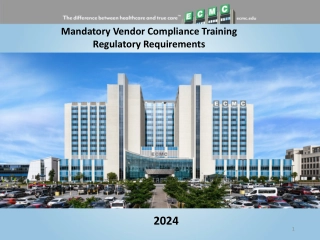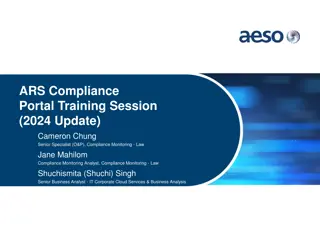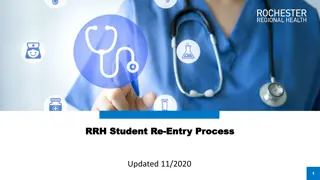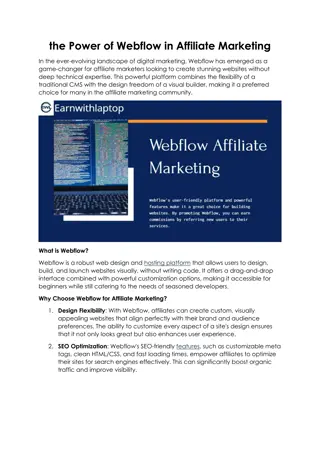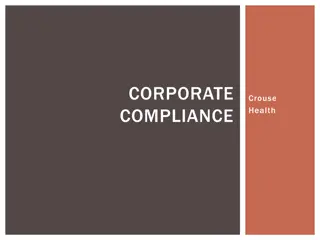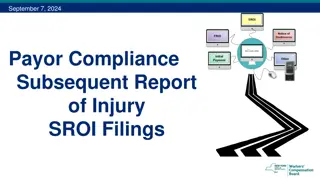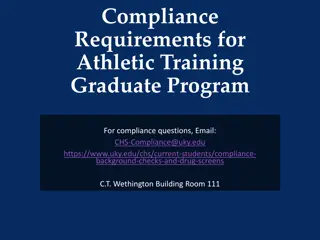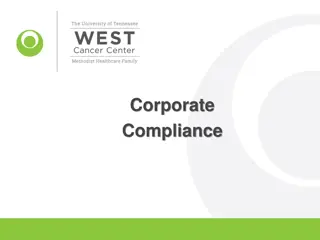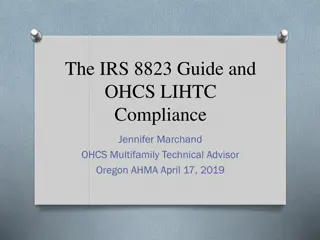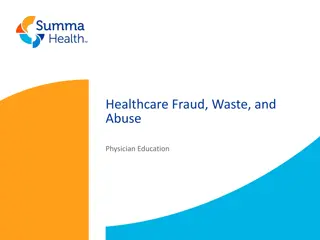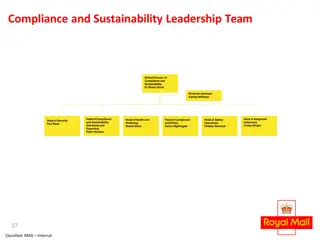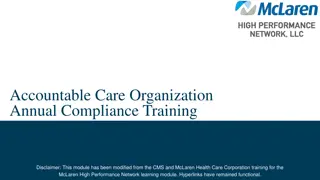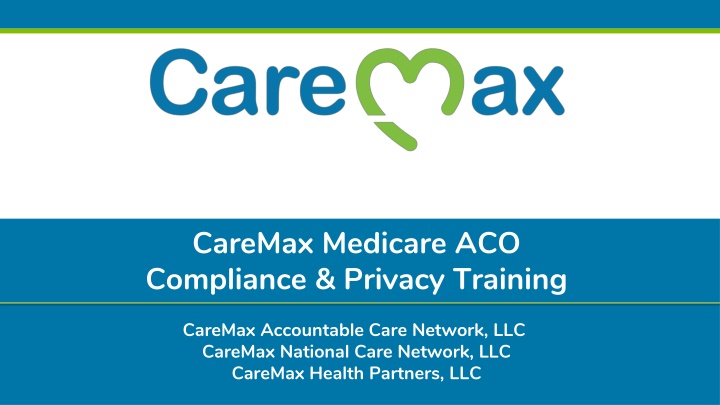
CareMax Medicare ACO Compliance & Privacy Training Information
Learn about CareMax Medicare ACO compliance and privacy training, including details on the program, policies, and access to related documents for providers participating in Medicare Shared Savings and Accountable Care Organization models.
Download Presentation

Please find below an Image/Link to download the presentation.
The content on the website is provided AS IS for your information and personal use only. It may not be sold, licensed, or shared on other websites without obtaining consent from the author. If you encounter any issues during the download, it is possible that the publisher has removed the file from their server.
You are allowed to download the files provided on this website for personal or commercial use, subject to the condition that they are used lawfully. All files are the property of their respective owners.
The content on the website is provided AS IS for your information and personal use only. It may not be sold, licensed, or shared on other websites without obtaining consent from the author.
E N D
Presentation Transcript
CareMax Medicare ACO Compliance & Privacy Training CareMax Accountable Care Network, LLC CareMax National Care Network, LLC CareMax Health Partners, LLC
Introduction to CareMax ACO Programs In pursuit of delivering high-quality, efficient care to Medicare beneficiaries, providers are participating in a CareMax Medicare Shared Savings Program (MSSP) or Accountable Care Organization Realizing Equity, Access, and Community Health (ACO REACH) Model. ACO Program Medicare Shared Savings Program (MSSP) ACO REACH ACO Legal Entity Name CareMax National Care Network, LLC (CNCN) CareMax Accountable Care Network, LLC (CACN) CareMax Health Partners, LLC (CHP) This CareMax Medicare ACO model provides an opportunity for CNCN, CACN, and CHP Providers to apply the CareMax Community Care Model to Medicare beneficiaries. By working together, we can provide high quality care to Medicare beneficiaries in a cost-efficient and coordinated manner. 2 Proprietary and Confidential: Do Not Distribute
The Purpose of this Training: Your guide to the CareMax Compliance and Privacy Program As a condition of participation, the Centers for Medicare & Medicaid Services (CMS) expects providers to complete a training on compliance and privacy principles that apply to these innovation programs. As a benefit to participating in CMS innovation programs through CareMax, CNCN, CACN, and CHP providers can attest their compliance to CMS requirements by completing this training. 3 Proprietary and Confidential: Do Not Distribute
Medicare ACO Compliance and Privacy Policies All CareMax Partners are expected to be aware of, and comply with, the CMS rules and regulations summarized and outlined by the CACN, CNCN, and CHP ACO Compliance and Privacy Program Descriptions and associated policies and procedures. CareMax Partners include board members, officers, employees, vendors, agents, ACO participating providers, and such staff of CareMax acting as agent(s) for CareMax and performing certain operational functions for or doing business related to the CACN, CNCN, and CHP Medicare ACO programs. The information presented in this training includes key elements of the CMS rules and regulations that govern the CACN, CNCN, and CHP Medicare ACOs. 4 Proprietary and Confidential: Do Not Distribute
CareMax Medicare ACO Compliance & Privacy Program Documents Proprietary and Confidential: Do Not Distribute
Accessing CareMax Medicare ACO Compliance and Privacy Program Documents The following Compliance and Privacy documents are attached to the ACO Provider Welcome Packet email: Compliance and Privacy Program Description A written document describing the CareMax Compliance and Privacy Programs for each CareMax Medicare ACO. Code of Business Conduct and Ethics Every person conducting business on behalf of CareMax must follow the CareMax Code of Business Conduct and Ethics, together with all applicable laws and CareMax practices. This includes all CareMax Partners and all CareMax locations, subsidiaries, and affiliates. Policies and Procedures CareMax maintains policies and procedures for its Partners, including: ACO Participant Compliance Training Reporting Violations and Complaints Conflict of Interest CareMax Partner Enforcement and Discipline ACO Beneficiary Freedom of Choice PY 2024 MSSP Beneficiary Notification Poster if participating in an MSSP; does not apply to ACO REACH Please print and display the attached Beneficiary Notification Poster in your waiting room. Copies must also be made available to MSSP patients upon request. 6 Proprietary and Confidential: Do Not Distribute
Applicable Laws Proprietary and Confidential: Do Not Distribute
CMS Expectations of CareMax Partners CMS expects CareMax Partners to: Comply with: The CMS Program Participation Agreements (for MSSP and ACO REACH) All applicable contracts, such as the CareMax Participating Provider Agreement (PPA) Remain subject to all federal laws governing Medicare fraud and abuse including the: False Claims Act (FCA) Anti-Kickback Statute (AKS) Physician Self-Referral Law (Stark Law) Social Security Act, including the Exclusion Statute and the Civil Monetary Penalties Law (CMPL) Criminal Health Care Fraud Statute 8 Proprietary and Confidential: Do Not Distribute
The False Claim Act (FCA) The civil FCA, 31 United States Code (U.S.C.) Sections 3729 3733, protects the Federal Government from being overcharged or sold substandard goods or services. The civil FCA imposes civil liability on any person who knowingly submits, or causes the submission of, a false or fraudulent claim to the federal government. The terms knowing and knowingly mean a person has actual knowledge of the information or acts in deliberate ignorance or reckless disregard of the truth or falsity of the information related to the claim. No specific intent to defraud is required to violate the civil FCA. Examples: A physician knowingly submits claims to Medicare for medical services not provided or for a higher level of medical services than actually provided. Penalties: Filing false claims may result in fines of up to three times the programs' loss plus $11,000 per claim filed. Additionally, under the criminal FCA, 18 U.S.C. Section 287, individuals or entities may face criminal penalties for submitting false, fictitious, or fraudulent claims, including fines, imprisonment, or both. 9 Proprietary and Confidential: Do Not Distribute
The Anti-Kickback Statute (AKS) The AKS, 42 U.S.C. Section 1320a-7b(b), makes it a crime to knowingly and willfully offer, pay, solicit, or receive any remuneration directly or indirectly to induce or reward patient referrals or the generation of business involving any item or service reimbursable by a federal health care program. When a provider offers, pays, solicits, or receives unlawful remuneration, the provider violates the AKS. NOTE: Remuneration includes anything of value, such as cash, free rent, expensive hotel stays and meals, and excessive compensation for medical directorships or consultancies. Example: A provider receives cash or below-fair-market-value rent for medical office space in exchange for referrals. Penalties: Criminal penalties and administrative sanctions for violating the AKS may include fines, imprisonment, and exclusion from participation in the federal health care program. Under the CMPL, physicians who pay or accept kickbacks also face penalties of up to $50,000 per kickback plus three times the amount of the remuneration. The safe harbor regulations, 42 Code of Federal Regulations (C.F.R.) Section 1001.952, describe various payment and business practices that, although they potentially implicate the AKS, are not treated as offenses under the AKS if they meet certain requirements specified in the regulations. Individuals and entities remain responsible for complying with all other laws, regulations, and guidance that apply to their businesses. 10 Proprietary and Confidential: Do Not Distribute
The Physician Self-Referral (Stark) Law The Physician Self-Referral Law, 42 U.S.C. Section 1395nn, often called the Stark Law, prohibits a physician from referring patients to receive designated health services payable by Medicare or Medicaid to an entity with which the physician or a member of the physician s immediate family has a financial relationship, unless an exception applies. Example: A physician refers a beneficiary for a designated health service to a clinic where the physician has an investment interest. Penalties: Penalties for physicians who violate the Stark Law may include fines, civil monetary penalties (CMPs) ranging from $10,000 to $50,000 per violation, repayment of claims, and potential exclusion from participation in the federal health care programs. 11 Proprietary and Confidential: Do Not Distribute
Exclusion Statute The Exclusion Statute, 42 U.S.C. Section 1320a-7, requires the OIG to exclude individuals and entities convicted of any of the following offenses from participation in all federal health care programs: Medicare or Medicaid fraud, as well as any other offenses related to the delivery of items or services under Medicare or Medicaid Patient abuse or neglect Felony convictions for other health care-related fraud, theft, or other financial misconduct Felony convictions for unlawful manufacture, distribution, prescription, or dispensing controlled substances The OIG also may impose permissive exclusions on other grounds, including: Misdemeanor convictions related to health care fraud other than Medicare or Medicaid fraud, or misdemeanor convictions for unlawfully manufacturing, distributing, prescribing, or dispensing controlled substances Suspension, revocation, or surrender of a license to provide health care for reasons bearing on professional competence, professional performance, or financial integrity Providing unnecessary or substandard services Submitting false or fraudulent claims to a federal health care program Engaging in unlawful kickback arrangements Defaulting on health education loan or scholarship obligations Excluded providers may not participate in the federal health care programs for a designated period. If you are excluded by OIG, then federal health care programs, including Medicare and Medicaid, will not pay for items or services that you furnish, order, or prescribe. Excluded providers may not bill directly for treating Medicare and Medicaid patients, and an employer or a group practice may not bill for an excluded provider s services. At the end of an exclusion period, an excluded provider must seek reinstatement; reinstatement is not automatic. The OIG maintains a list of excluded parties called the List of Excluded Individuals/Entities (LEIE). 12 Proprietary and Confidential: Do Not Distribute
Civil Monetary Penalties Law The CMPL, 42 U.S.C. Section 1320a-7a, authorizes OIG to seek CMPs and sometimes exclusion for a variety of health care fraud violations. Different amounts of penalties and assessments apply based on the type of violation. CMPs also may include an assessment of up to three times the amount claimed for each item or service, or up to three times the amount of remuneration offered, paid, solicited, or received. Violations that may justify CMPs include: Presenting a claim you know, or should know, is for an item or service not provided as claimed or that is false and fraudulent Violating the AKS Making false statements or misrepresentations on applications or contracts to participate in the Federal health care programs 13 Proprietary and Confidential: Do Not Distribute
Criminal Health Care Fraud Statute The Criminal Health Care Fraud Statute, 18 U.S.C. Section 1347 prohibits knowingly and willfully executing, or attempting to execute, a scheme or lie in connection with the delivery of, or payment for, health care benefits, items, or services to either: Defraud any health care benefit program Obtain (by means of false or fraudulent pretenses, representations, or promises) any of the money or property owned by, or under the control of, any health care benefit program Example: Several doctors and medical clinics conspire in a coordinated scheme to defraud the Medicare Program by submitting medically unnecessary claims for power wheelchairs. Penalties: Penalties for violating the Criminal Health Care Fraud Statute may include fines, imprisonment, or both. 14 Proprietary and Confidential: Do Not Distribute
Beneficiary Rights and Protections Proprietary and Confidential: Do Not Distribute
Beneficiary Freedom of Choice CMS requires that Medicare Beneficiaries maintain freedom of choice. CMS requires that CareMax Partners communicate the benefits of receiving care from members of our ACO but may not adopt policies that inhibit patients from exercising their right to obtain services from any Medicare provider. Patients can go to any health care provider who accepts Medicare, even after choosing a primary clinician. Patients can choose a different health care provider as their primary clinician at any time. 16 Proprietary and Confidential: Do Not Distribute
Opt Out of Data Sharing CMS may share beneficiary claims data unless the beneficiary opts out of data sharing. CMS requires that: CareMax Partners discuss the benefits of Medicare data sharing with a beneficiary (i.e., to ensure coordinated care and to avoid unnecessary duplication of services) but must honor a beneficiary s request to opt out of data sharing. CareMax Partners must notify Medicare ACO management if any beneficiary communicates their desire to opt out of data sharing (or to opt back in). 17 Proprietary and Confidential: Do Not Distribute
CareMax Partner Requirements Proprietary and Confidential: Do Not Distribute
Medical Necessity CMS requires: CareMax Partners make medically necessary covered services available to all ACO beneficiaries and not withhold any medically necessary care, and CareMax Partners not take any action to avoid at-risk beneficiaries. 19 Proprietary and Confidential: Do Not Distribute
Conflict of Interest Requirements Conflict of Interest (COI): a potential Conflict of Interest arises as a result of situations or circumstances whenever an individual s professional interests, such as professional obligations or judgment owed to CareMax and its constituencies are compromised by, or could be perceived as being compromised by, his or her roles, secondary commitments or financial interests. If a potential Conflict of Interest arises at any time, CareMax Partners are required to disclose such conflict to the CareMax Chief Compliance Officer at teresa.mcmeans@caremax.com / 786-206-8721 and/or update his/her annual COI disclosure survey (if applicable). All CareMax Partners must comply with the requirements of the ACO Conflict of Interest Policy related to potential conflicts. The ACO Conflict of Interest Policy is attached to the Provider Welcome Packet email. 20 Proprietary and Confidential: Do Not Distribute
Marketing Materials or Activities It is important that CareMax Medicare ACO program-related communications and marketing materials accurately reflect the services and quality of care available within CareMax. CMS requires that CareMax obtain prior approval from CMS of any ACO marketing materials or beneficiary communications used by CareMax Partners. You must submit any proposed CareMax Medicare ACO program marketing activities or written communications to CareMax for initial review. Upon CareMax review and approval, CareMax will submit materials to CMS for approval. Such materials or activities may include, but are not limited to, brochures, advertisements, outreach events, letters to beneficiaries, web pages, mailings, social media, or other activities conducted by or on behalf of the ACO when used to educate, solicit, notify, or contact Medicare patients regarding the ACO. 21 Proprietary and Confidential: Do Not Distribute
Marketing Materials or Activities (cont.) If you are unsure if your materials require CMS approval, it is always best to ask. Questions and materials for review can be directed to the CareMax Medicare ACO Program Team by emailing CareMaxACO@caremax.com. Prior to submission to CMS, the CareMax Medicare ACO Program Team will: - Contact you to review the proposed materials together - Recommend edits as necessary - Share the materials with the CareMax Compliance Department and Marketing Department for internal review and approval Upon approval by CMS, the CareMax Medicare ACO Program Team can support publication and distribution of the approved materials. 22 Proprietary and Confidential: Do Not Distribute
Additional Notification Requirements CMS requires: CareMax Partners to inform the CareMax Medicare ACO Compliance Officer and/or Chief Compliance Officer immediately if any of the following occurs: Exclusion from any federal or state health care program you, your practice, or your providers. Note: Providers are required by law to ensure members of their staff are not excluded from participation in any federal or state health care program. If you are unsure how to monitor for exclusions, please contact the CareMax Compliance Department at Compliance@CareMax.com for assistance. Any action taken by HHS, OIG, or DOJ related to significant misconduct or allegations of fraud. Any formally initiated claim or allegation of malpractice, professional misconduct, or grounds for licensure or clinical privilege disciplinary action raised against a provider or physician group practice by any payer, governmental agency, professional organization, healthcare facility, healthcare practice, or plaintiff. CareMax is required to report probable violations of law to an appropriate law enforcement agency. 23 Proprietary and Confidential: Do Not Distribute
Compliance with Privacy Regulations CMS requires: CareMax Partners may only access, use, or disclose patient information and medical claims data (provided by CMS) as permitted by law. CareMax Partners must protect patient information and CMS medical claims data from being accessed, used, or disclosed inappropriately. CareMax Partners must make available and distribute their Notice of Privacy Practices (NOPP) to all patients and must maintain copies of the NOPP in accordance with the requirements of CareMax Participating Provider Agreements (PPAs) and the Health Insurance Portability and Accountability Act (HIPAA). 24 Proprietary and Confidential: Do Not Distribute
Document Retention and Access CMS requires: Records relating to any aspect of CareMax ACO programs must be retained for at least ten (10) years after the end of each respective Agreement. CMS requires CareMax Partners to cooperate with evaluation, review, and monitoring activities, providing CMS and independent evaluators access when requested. CareMax Partners may not share any data or findings specific to beneficiaries or reference the CareMax Medicare ACO Program in publications without approval from the CareMax Medicare ACO Compliance Officer (who will consult with CMS as required). 25 Proprietary and Confidential: Do Not Distribute
Investigation, Audit, and Remediation Investigation The CareMax Compliance Department will facilitate the investigation of each compliance and/or privacy complaint or concern related to CareMax Medicare ACO activity. Based on the results of an investigation, the Compliance Department will work with CareMax Medicare ACO management in developing and executing a remediation plan. Audit As appropriate and from time to time, the CareMax Compliance Department will conduct assessments or audit activities to confirm compliance with certain requirements. Remediation If the CareMax Compliance Department concludes, after investigation or audit, that the CareMax Code of Conduct, CareMax Medicare ACO Compliance & Privacy Program, policies, or other applicable laws and regulations may have been violated, CareMax Medicare ACO management will be notified. Remediation may include appropriate remediation, discipline, and penalties, up to and including termination from participation in CareMax Medicare ACO program. 26 Proprietary and Confidential: Do Not Distribute
CareMax Partner Enforcement and Discipline CMS requires that: Every CareMax Partner conducting business related to the operations of the CareMax Medicare ACO programs comply with the CareMax Code of Conduct, CareMax policies, Participating Provider Agreements (PPAs), and all applicable laws and regulations. Examples of compliance issues that can be reported to the CareMax Medicare ACO Compliance Officer include but are not limited to: - Notifications of possible breaches of information or known noncompliance with policies; - Complaints made by patients; and - Results of an audit reviewing the CareMax Partner s practice. All reports received of possible breaches or noncompliance will be investigated by CareMax Medicare ACO management and remediation will be aligned with the severity of the violation. Providers have the right to contest or appeal a decision made by the CareMax Medicare ACO and can formally do so by submitting the required information in writing within 30 days of the initial decision. 27 Proprietary and Confidential: Do Not Distribute
Compliance Questions and Reporting Open Lines of Communication CareMax Partners may direct questions related to the CareMax Medicare ACO Compliance and Privacy Program to: CareMax Medicare ACO Director Kristen Shaw, MPH Kristin.Shaw@caremax.com Telephone: (716) 725-1100 CareMax Medicare ACO Compliance Officer Kim Anderson, MPH, CHC Kimberly.Anderson@caremax.com Telephone: (305) 908-4307 Reporting CareMax Partners are required to report suspected compliance and privacy concerns. Reports must be made to the CareMax Medicare ACO Compliance Officer. A hotline has been established for individuals who wish to report their concerns anonymously. The toll-free hotline number is (800) 672-3039, available 24 hours a day, 7 days a week. You may also anonymously report your concern online at: https://reportanissue.com/caremax/. CareMax Partners who report a concern in good faith will be protected against retaliatory action. 28 Proprietary and Confidential: Do Not Distribute
Thank you for reviewing the Medicare ACO Compliance & Privacy Training


